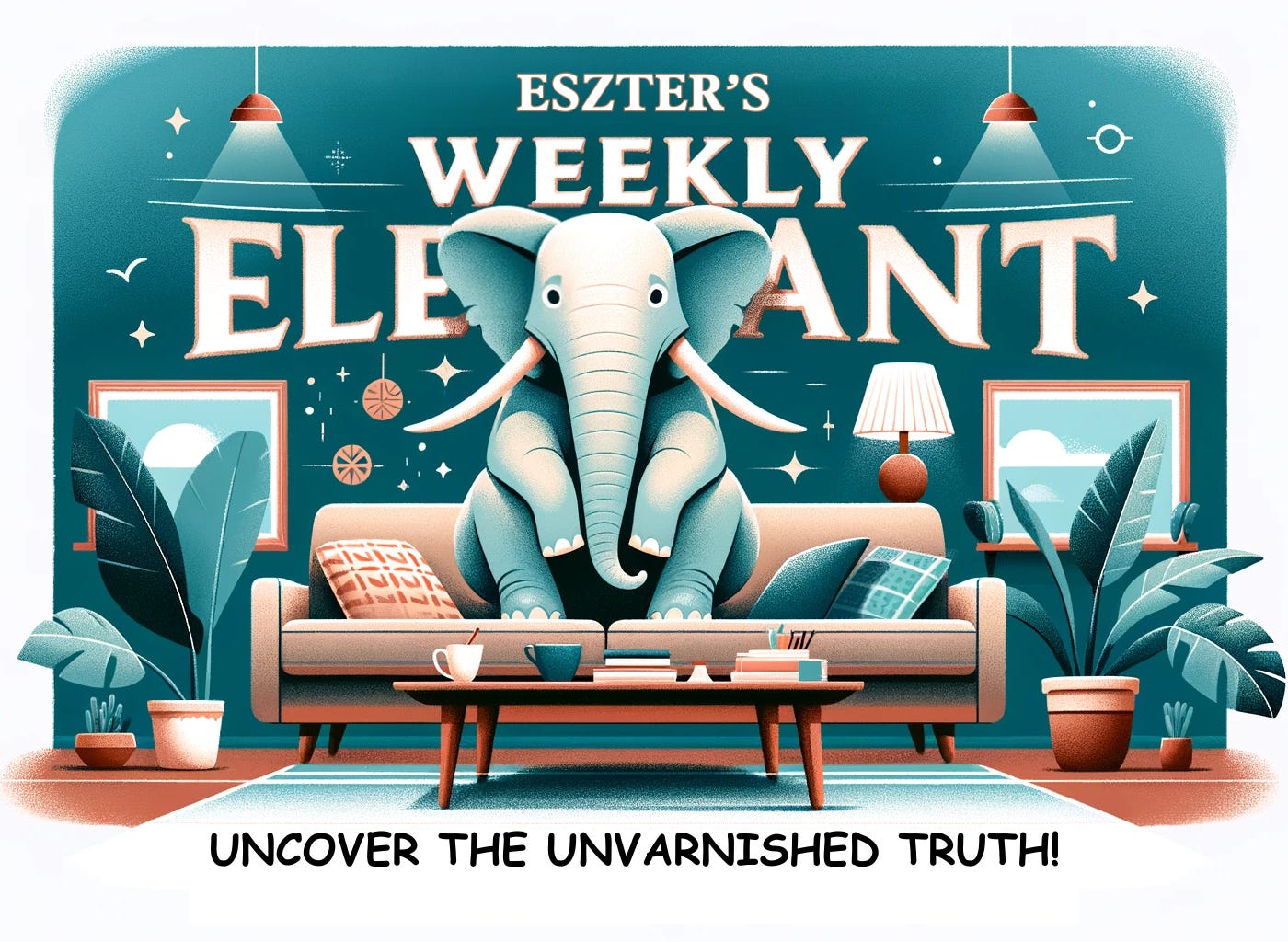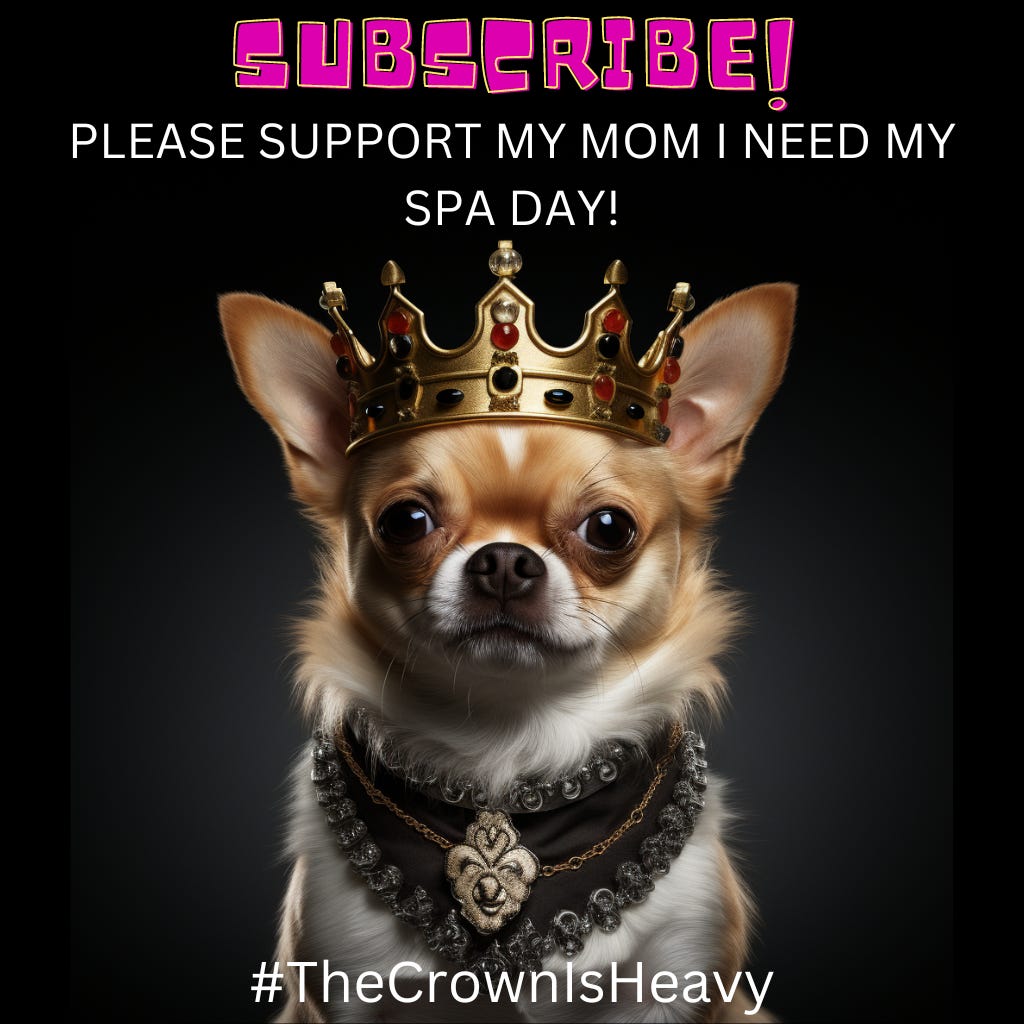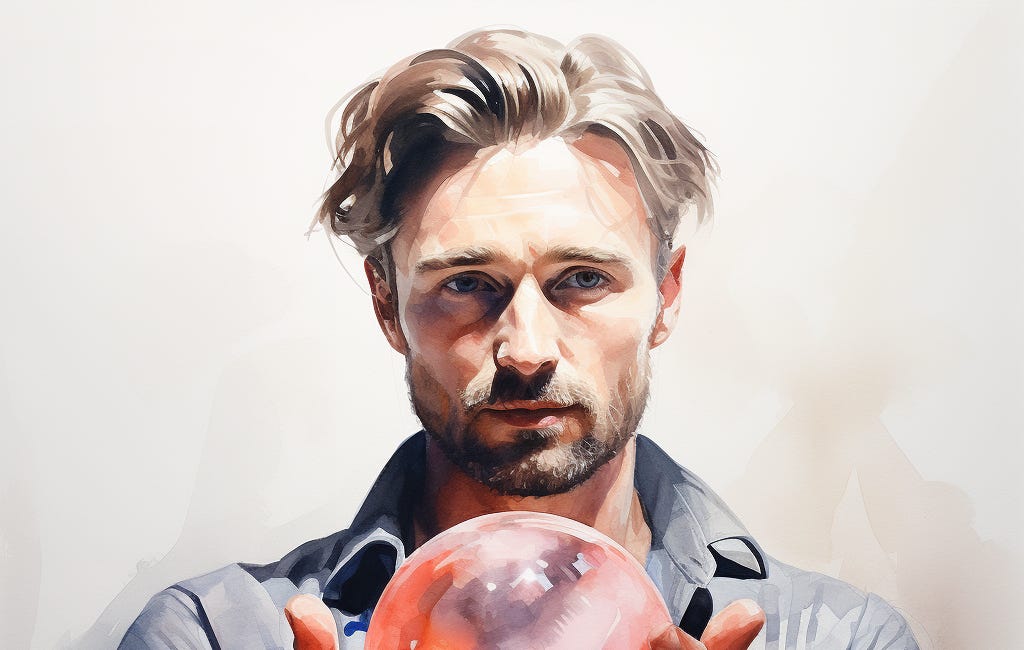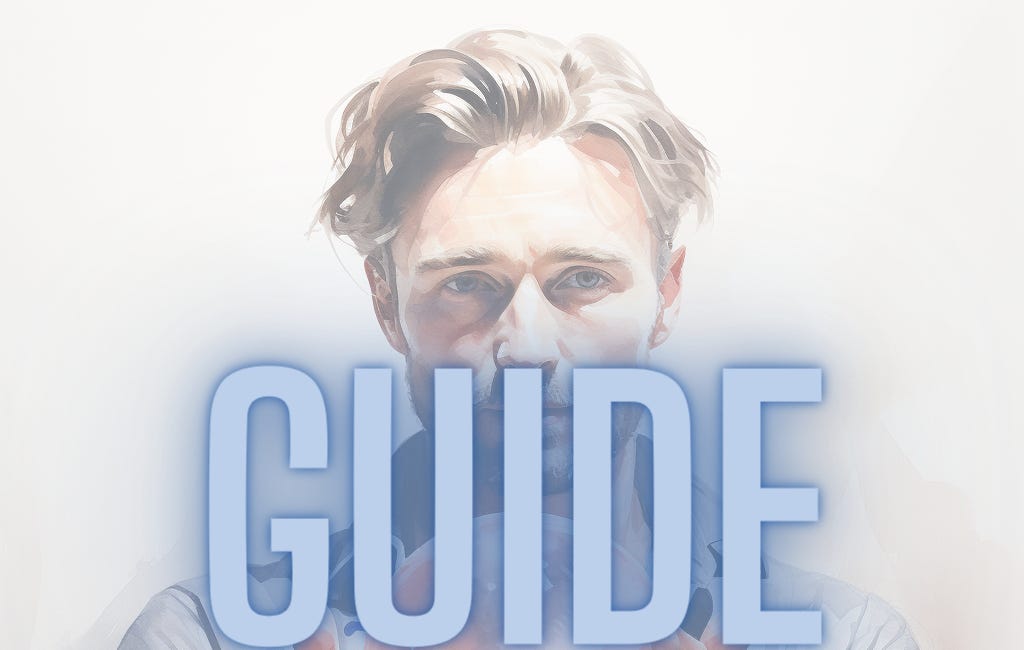Welcome to the fifth issue of Eszter's Weekly Elephant! We hope everyone has had a great week!
This week, we encountered a minor conflict among our dogs. We live with seven adopted dogs who, fortunately, get along well with each other thanks to some training. Most of the pack is older, with everyone being over ten years of age, except for our youngest dog, who is three.
This week's drama, as is often the case, unfolded between our two Dachshund mixes. Our fifteen-year-old Dachsie mix, who is deaf, constantly gets startled when someone approaches him because he cannot hear the movement. Waking from his slumber, he lunged at our eleven-year-old younger Dachsie mix. Anyone who has ever had a Dachshund knows that Dachshund genes are among the most dominant in the world, and even diluted with other breeds' genes, they convince their Dachshund descendants that they are the rulers of the world.
However, having two rulers in one world can be problematic, hence our two Dachsie mixes regularly find themselves in some skirmish. Sometimes it's over a spot, sometimes food, or just to settle the never-ending debate of who sits atop the world's throne. Of course, these clashes are never bloody, more like a playful jump and a growl, a "take me seriously now" kind of teeth chattering. Their life is comfortable enough that neither wants to fight seriously.
What always strikes me during such conflicts is that most dogs never hold grudges; they don't stay offended at each other. And if they do, it's certain that all waves of discontent will calm down within half an hour, with the two Dachsies usually peacefully snoring next to each other on the soft dog bed. Why we humans can't resolve conflicts this quickly and efficiently, why we need to reconcile, to atone, to hold onto anger, and sometimes sentence each other to days of silence, is indeed an interesting topic. Dogs let go of their grievances easily, a trait worth emulating from them.
The nature, causes, and mechanisms of being offended is a topic that affects many of us, and let's face it, not just because there are easily offended people around us, but also because we ourselves get offended, hopefully only occasionally. By observing the situations that upset us, we can discover interesting correlations about ourselves. However, to do this, we first need to understand how we humans get offended, identify the root causes of offense, and learn the best ways to approach family members, colleagues, and friends who do nothing but jump from one state of offense to another.
Given the wide interest in this topic, we have decided to make the recent article “The Anatomy of Offense” freely available to readers of Eszter's Weekly Elephant until next Monday. Those who wish to understand the reasons behind being offended better, read it!
Meanwhile, we'll try to convince our house duchess, Sissy the Chihuahua mix, to learn from the article, because unlike the other dogs, she easily gets offended and is hard to appease. But then again, royal offspring are just like that, right?
#TheCrownIsHeavy
If you'd like to upgrade while using the App, you can go to your settings page on Substack.com, scroll down and click on "Eszter’s Weekly Elephant" among your subscriptions, then press "Upgrade to paid."
Let’s continue with Eszter’s Weekly Elephant
This week in Eszter’s Weekly Elephant, alongside the mechanics and causes of being offended, we've tackled another topic that affects many: the extent to which parents truly know their children. This is fascinating because it explores how well we recognize our children's true faces and abilities, our openness to understanding and supporting their dreams, and prompts us to reflect on our own childhood experiences.
Were we understood, could we be ourselves? Could we express our true feelings, or did we have to play a role throughout our childhood? If we played a role, do we still do so today? If we continue to play roles, is it only in front of our family, pretending to be someone we're not, or does it continue even when our family isn't around? Has the childhood mask solidified onto us? In which areas of our life are we not truly ourselves?
If we notice that we are still wearing our childhood masks, then there's a chance for us to peel off the false layers and discover who we really are. Recognizing that we couldn't be ourselves, that we gave up certain dreams to be accepted by our family, is the first step toward finally being our true selves. Having the courage to express our authentic selves is important not just to avoid the exhaustion of constant pretense and to find people with whom we can form genuine friendships and relationships, but also because true, unblocked creativity requires authenticity. After all, if we are unable to show our true selves to those closest to us, how can we dare to expose our innermost creations to the world? Many creative blocks stem from this conflict. Anyone who wants to embark on or delve deeper into the journey toward their true self should read "Children Forever in Masks.”
Eszter’s Reading Nook
This week, we have an exciting surprise: the short story “The Child Turned to Stone,” featured two weeks ago, is now freely available in Eszter's Reading Nook for readers of Eszter's Weekly Elephant also until Monday. This story explores the relatively unknown yet widely impactful phenomenon of having a vanishing twin. We will post more articles about this phenomenon in Eszter's Weekly Elephant for those interested in learning more about its impact on an individual's life. Reading the guide linked to the story might reveal if this topic resonates with you, and the short exercise provided could begin the healing process for the prenatal wound.
The short story of the week is an exciting, cheerful tale about a college boy with special abilities, known by his true name to only a few of his peers, as most call him "Seer." Those looking to immerse themselves in a feel-good story, don't hesitate! Read on!
The accompanying guide to the story reveals the family system dynamics it highlights, including the skills children develop from difficult childhoods, the concept of parentification, its effects on adult life, its occurrence, and starting points for healing one's relationship with their parents, at least mentally, to prevent future problems.
Let's not forget that childhood experiences echo into adulthood, and we often underestimate the depth of their impact. My husband and I believe it's worthwhile to be open and to better understand the workings of our own psyche, to effectively solve the recurring problems in our lives. The stories and guides appearing in Eszter's Reading Nook help with this in an entertaining way.
Eszter’s Magic
For those familiar with the sensation of knowing you're about to do something that will undoubtedly cause an important part of your life to explode, and you're aware that you should handle it differently, more calmly, but the little devil inside has already whispered in your ear and, against your better judgment, you press the detonator, this week's essay in Eszter's Magic is for you.
“The Art of the Deal or How Do We Cheat Ourselves Out of Our Best Possible Life" speaks to the giggling, then sobbing demolition experts who repeatedly sabotage their own lives, relationships, careers, and are incapable of stopping their pyromaniac, explosion-addicted selves.
It's for those who, with a mocking smile, tell their boss he's an idiot and then tearfully look at their empty bank account. For those who continually ignore their partner's request for more time together, then end up spooning ice cream and sniffling alone in the corner of the couch after their partner has moved out. For those determined to get in shape for their sister's wedding but still eat the second bar of chocolate. For those who vow never to call their abusive ex-partner again, but on a lonely Friday night, end up dialing their number anyway.
Why we do this to ourselves, why we can't resist our self-destructive impulses, is what "The Art of the Deal" discusses. Give it a read!
Finally, I'd like to draw your attention to another 150-word short story. These vivid, aromatic snapshots capturing scenes are always the result of a long editing process. Much like a diamond is cut, polished, and perfected, I cut, edit, shorten, and refine these brief snapshots to make them more striking, momentarily pulling the reader out of their present to transport them to another place, life, or story. I hope you'll enjoy this week's gem, “Haunted Mind”!
To conclude
This week, we've talked about a variety of human themes, from being offended and the masks that have solidified on us to the vanishing twin, parentification, and self-sabotage. Those willing to absorb this information, to examine and answer the questions posed within themselves, we believe, have taken a significant step this week toward healing the painful feelings present in all of us, better understanding themselves, and living a more authentic life.
My clients often say how illogical and complex the human psyche is, but I've never agreed with that. The psyche has its own logic, even if it's a peculiar one. Those who devote the time and energy will quickly learn how things work within their psyche and will be able to efficiently untangle the knots in their lives. This knowledge, we believe, is very fundamental and incredibly useful.
We hope that we've been able to provide you with exciting information and entertaining stories this week! Remember, "The Anatomy of Offense" and the short story "The Child Turned to Stone" are free to read until Monday! Don't miss out!
Wishing everyone a pleasant weekend and happy reading!
Disclaimer: The content in our publications should not be considered professional psychological or psychiatric advice. Therefore, everyone reads the articles and applies their content at their own risk.
Home | Notes | Articles | Eszter’s Magic | Literary Bonbons | Short Stories and Guides | Beyond the Book | EWE Issues | Archive | About












